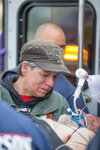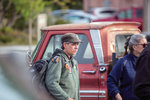Four days before 63-year-old Paul Gomes suffered a heart attack on the streets of Port Townsend and died, he had been sitting at the Haller Fountain, enjoying some sunshine and people-watching with his partner, Erika Malloy.
This item is available in full to subscribers.
We have recently launched a new and improved website. To continue reading, you will need to either log into your subscriber account, or purchase a new subscription.
If you had an active account on our previous website, then you have an account here. Simply reset your password to regain access to your account.
If you did not have an account on our previous website, but are a current print subscriber, click here to set up your website account.
Otherwise, click here to view your options for subscribing.
* Having trouble? Call our circulation department at 360-385-2900, or email our support.
Please log in to continue |
|


Four days before 63-year-old Paul Gomes suffered a heart attack on the streets of Port Townsend and died, he had been sitting at the Haller Fountain, enjoying some sunshine and people-watching with his partner, Erika Malloy.
“I’d had to make the excuse that I was tired to get him to sit down,” Malloy said. She and Gomes had been in a common law marriage for 7 years, and she knew all the tricks to deal with his stubborn ways.
Gomes came from a large Portugeuse family. He was a Marine veteran, a retired trucker, and security officer. But the 47-year-old former teacher said she was up for the challenge. She credits her Gaelic blood and experience with recalcitrant students.
“I’d get up in his face sometimes,” she said. “Mostly about his health. He wasn’t taking care of himself.”
That day at the Haller Fountain, both Malloy and Gomes knew he was struggling, she said.
She had grown accustomed to rubbing Tiger Balm on his chest, helping calm his heart pain. They would fight about his food choices, and about going to the doctor. But while they were both living at the homeless shelter at the American Legion, doctor’s appointments were not their main priority. The moments at Haller Fountain were a rare respite from struggle, but were no cure.
Four days after they had rested there, he was flown to Harborview after suffering a heart attack in the parking lot at the Quimper Mercantile. Despite the quick action of nearby EMTs, Gomes died shortly after arriving at the hospital.
Dealing with the grief of losing her partner, Malloy returned a few days later to their favorite store: Big Wolf Trading Company.
“The woman working there said, ‘Did you enjoy your birthday present?’ Malloy said. “I told her, it wasn’t anywhere near my birthday.”
Then it dawned on her what the woman was talking about.
That day they sat at the fountain, Gomes had gotten up and said he was going “to go down the road apiece.”
At Big Wolf Trading Company, their favorite shop, he bought her a beaded necklace, bringing it back and giving it to her without much explanation.
“Paul had bought me the necklace as a birthday present,” she said. “He knew he wasn’t going to live until my next birthday.”
Having been his caretaker while they lived for a time in Malloy’s truck, and then in the homeless shelter, she knew he wasn’t getting in trouble. Though she tried her hardest, taking care of their health while homeless was an unending struggle.
This is not an uncommon problem, said Mike Johnson, the manager of the homeless shelter, which is operated by the American Legion, OlyCAP and COAST.
“One of the first clients I had was a gentleman in his 40s whose liver was failing,” Johnson said. “Because he was homeless, his provider kept lowering the bar when it came to what they considered liver failure to be.”
OlyCAP worked for months before they finally got this client set up with housing and connected to Jefferson Transit, so he could go to dialysis appointments.
“They had given him six months to live,” Johnson said. “Now he’s thriving.”
Over the winter season, 13 of the people staying at the shelter, which houses a total of 32 people, were over the age of 62. While the shelter provides warm beds, meals and OlyCAP’s services to search for housing opportunities, DSHS does not allow a caretaker on site, Johnson said, even though the population at the shelter are often more vulnerable to illness.
And while Malloy might be wondering why Gomes wouldn’t go to the doctor more, Johnson said that is not unusual for someone who is homeless.
“It’s like Maslow’s Hierarchy of Needs,” he said, referring to Abraham Maslow’s psychological theory that until people’s basic needs for things like food, water, safety and warmth are met, they are not motivated to seek more complex satisfactions.
“The more base the need, the less likely you’re going to address the upper needs,” he said, such as getting a doctor’s appointment, or buying a cell phone to be able to call and schedule an appointment.
Not only that, but finding a home takes priority.
“The impact financially of trying to keep your life together when you’ve got a medical bill is just one more barrier to getting a home,” Johnson said. “There are so many things that will stop a person from getting help.”
Malloy said she and Gomes had struggled to get benefits because of their common law marriage. While he received veteran’s benefits, they would not cover her.
Recently, however, they had been on track to get into housing with the help of OlyCAP.
“They were in the process of getting a place in Sequim,” Johnson said. “He was a week away from getting his VASH (Veteran Affairs Supportive Housing) voucher. Once that happens, the likelihood of getting help is exponentially higher.”
Housing would have helped, Malloy said.
“His health was bad because of a lack of housing,” she said. “I didn’t have a place to cook, so we weren’t eating healthy.”
But she said she was fighting a losing battle. Gomes left behind Malloy and a large family of both blood relatives and adopted siblings. He had four daughters and many grandchildren, Malloy said.
While Malloy lost her partner, she is still working with OlyCAP to get housing for herself, so that she can focus on her own health issues.
“If you can’t get past worrying about today, you’re not going to be able to deal with those higher needs,” Johnson said.